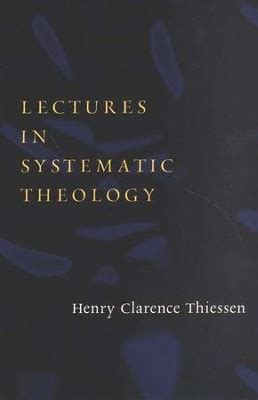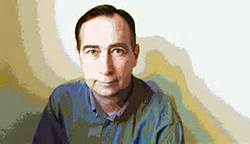A Quote by Henry Clarence Thiessen
The Bible is to the theologian what nature is to the scientist, a body of unorganized, or only partly organized facts. God has not seen fit to write the Bible in the form of a systematic theology; it remains for us, therefore, to gather together the scattered facts and to build them up into a logical system.
Related Quotes
It's better to emphasize biblical theology, partly because there are fine Study Bibles already available that lean into systematic theology, and partly because biblical theology is particularly strong at helping readers see how the Bible hangs together in its own categories: that is, God in his infinite wisdom chose to give us his Word in the 66 canonical books, with all of their variations in theme, emphasis, vocabulary, literary form, and distinctive contributions across time.
[The scientist] believes passionately in facts, in measured facts. He believes there are no bad facts, that all facts are good facts, though they may be facts about bad things, and his intellectual satisfaction can come only from the acquisition of accurately known facts, from their organization into a body of knowledge, in which the inter-relationship of the measured facts is the dominant consideration.
"Biblical theology" refers to something more precise than theology that is faithful to the Bible. It might be helpful to draw a contrast: at the risk of oversimplification, systematic theology tends to organize theology topically and with an eye cast on its contemporary relevance, while biblical theology tends to organize the same biblical material so that it is easier to see the distinctive contribution of each biblical book and human author, and to trace the trajectories of themes across the Bible so we see how the books of the Bible hold together.
I report when science clashes with the Bible story and when it reinforces it. Then I let the readers chew on it. As followers of Jesus and students of the Bible, what we're looking for is the truth. We find it by grappling with the facts. And when the truth remains a mystery that our facts can't solve, we live with it. We hold loosely to our waffling knowledge and tightly to Jesus.
What's true will never contradict what's true. Article 2 of the Belgic Confession, based on Psalm 19, Romans 1, and several other texts, declares that God has given us two reliable revelations: the words of Scripture and the facts of nature. Thus, it would be impossible for the facts of nature ever to contradict the words of the Bible.
A few years ago the Deists denied the inspiration of the Bible on account of its cruelty. At the same time they worshiped what they were pleased to call the God of Nature. Now we are convinced that Nature is as cruel as the Bible; so that, if the God of Nature did not write the Bible, this God at least has caused earthquakes and pestilence and famine, and this God has allowed millions of his children to destroy one another. So that now we have arrived at the question - not as to whether the Bible is inspired and not as to whether Jehovah is the real God, but whether there is a God or not.
Such debates [about the nature of Scripture], in my view, distract attention from the real point of what the Bible is there for. Squabbling over particular definitions of the qualities of the Bible is like a married couple squabbling over which of them loves the children more, when they should be getting on with bringing them up and setting them a good example. The Bible is there to enable God's people to be equipped to do God's work in God's world, not to give them an excuse to sit back smugly, knowing they possess all God's truth.
The God who inspired the Bible is the same God who made the universe, Earth, and all life. This God is the very definition of truth; therefore nature's record will never contradict Scripture and vice versa. When a seeming contradiction confronts us, we can know with certainty we have either misunderstood (one, the other, or both revelations) or perhaps we haven't yet dug deploy enough. Whatever the case, we can embrace the opportunity to gain greater knowledge and appreciation for the Bible, for nature, and for the God who is responsible for both.
The first job of the historian and of the journalist is to find facts. Not the only job, perhaps not the most important, but the first. Facts are the cobblestones from which we build roads of analysis, mosaic tiles that we fit together to compose pictures of past and present. There will be disagreement about where the road leads and what reality or truth is revealed by the mosaic picture. The facts themselves must be checked against all the available evidence. But some are round and hard--and the most powerful leaders in the world can trip over them. So can writers, dissidents and saints.
Let us, rather, gather facts, all the facts, regardless of aesthetic appeal or theoretical social worth, and spread those facts before us not as the soothsayer spreads the innards of a turkey but as a newspaper spreads its columns. Let us be journalists, then. And like all good journalists, we shall present our facts in an order that will satisfy the famous five W's: wow, whoopee, wahoo, why-not and whew.
People take it for granted that the physical world is both ordered and intelligible. The underlying order in nature - the laws of physics - are simply accepted as given, as brute facts. Nobody asks where they came from; at least not in polite company. However, even the most atheistic scientist accepts as an act of faith that the universe is not absurd, that there is a rational basis to physical existence manifested as law-like order in nature that is at least partly comprehensible to us. So science can proceed only if the scientist adopts an essentially theological worldview.
Sad, indeed, would the whole matter be if the Bible had told us everything God meant us to believe. But herein is the Bible greatly wronged. It nowhere lays claim to be regarded as the Word, the Way, the Truth. The Bible leads us to Jesus, the inexhaustible, the ever-unfolding Revelation of God. It is Christ "in whom are hid all the treasures of wisdom and knowledge," not the Bible, save as leading to Him.

































